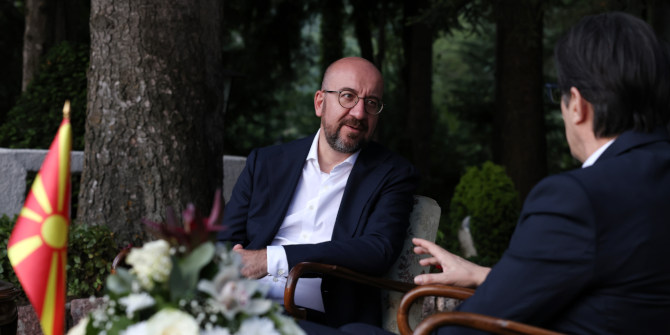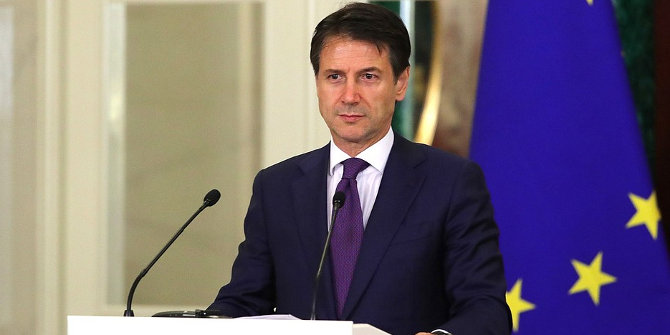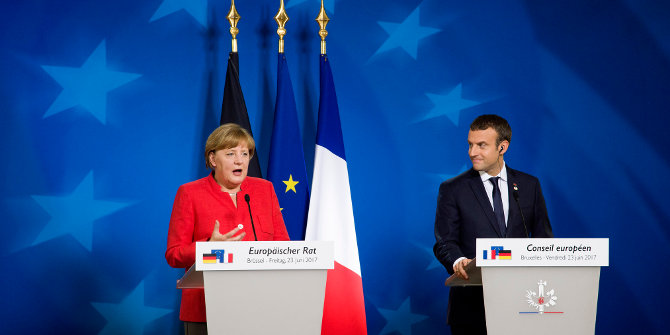Green parties suffered significant losses in the 2024 European Parliament elections. Yet as Mitya Pearson, Wolfgang Rüdig, Iakovos Makropoulos and Tomas Maltby explain, the picture was more nuanced than the headline figures suggest, with several Green parties either holding their position or making gains compared with 2019.
Before the 2019 European Parliament elections, the environment had risen in salience amid widespread climate protests. Green parties subsequently went on to secure their best result at a European Parliament election, with 55 members representing the European Green Party elected and the Greens/European Free Alliance (EFA) parliamentary group growing from 50 to 74 MEPs.
In the lead up to the 2024 European Parliament elections, the Ukraine war and the cost of living crisis loomed large, to some extent relegating climate change down the agenda. Much of the commentary ahead of the elections focused on the expected rise of radical right parties, which are generally hostile to climate policies. Although concern among EU citizens about the environment remains high – around 80 per cent still consider climate change “a very serious problem” – its salience in comparison to other issues declined.
In spring 2019, a Eurobarometer poll suggested that EU citizens considered climate change to be the second most important issue. However, by spring 2024, Europeans considered the environment and climate change combined as only the fifth most important issue, behind Ukraine, immigration, the international situation and inflation. Moreover, the most prominent protests in the lead up to the 2024 European Parliament elections were demonstrations by farmers against environmental regulations in several European countries.
The campaign
European elections are 27 individual election campaigns which are inevitably hard to summarise. However, at the European level, the Greens participated in the Spitzenkandidaten process, selecting Terry Reintke and Bas Eickhout as their candidates. The European Greens’ campaign included a push for further action to protect the environment in the face of criticism of EU climate policy by radical right parties.
The contrast between the Greens and the radical right was visible during the election debate in Maastricht in April. Eickhout argued that the perceived backlash against the European Green Deal reflected the fact that it is “not complete yet” and “only the beginning”, while Anders Vistisen, representing the right-wing Identity and Democracy Group, stated openly that he would not seek to ensure that the EU meets it climate targets, which he believed were “doing only one thing: shifting jobs out of Europe”.
More broadly, the European Greens agreed a common manifesto that set out positions on key issues debated during the election campaign. These included expressing their “undivided solidarity with and support for Ukraine and for continued financial and military support”, arguing “for the EU to relaunch political negotiations towards a two-state solution” in the Israel-Palestine conflict, and pushing for a more liberal approach to migration.
One of the main EU-level discussions during the campaign was what the results would mean for the arithmetic in the European Parliament, and whether – and how – Ursula von der Leyen might secure a majority for a potential second term as EU Commission President. Reintke made clear that the European Greens would only support a candidate for Commission President as part of a majority group that continued the Green Deal and did not include any of the groups to the right of the European People’s Party (EPP).
The Greens in the 2024 European elections
As predicted, in the 2024 election the Greens fell back from their successes during the “Green Wave” in 2019. The Greens/EFA dropped from the 74 seats they had won in 2019 to just 53 seats. The liberal Renew group and the Greens/EFA group both stood out compared to the other groups in the parliament as they saw similarly large percentage drops in their share of seats. This also meant that the Greens/EFA went from being the fourth largest group in the parliament to the sixth.
Figure 1: Total seats won by Green parties and the Greens/EFA group in the European Parliament
Source: Wolfgang Rüdig (2019); Mitya Pearson and Wolfgang Rüdig (2020); The European Union – Election Results; The Greens/EFA – Our MEPs. Note: The Greens joined forces with the EFA in the European Parliament from 1999 onwards. Sometimes different sources quote slightly different totals for the two groups’ total MEPs.
However, as Figure 1 demonstrates, when judged against the longer historical pattern of Green party results at European elections, 2024 looks more respectable, with similar totals achieved to those in 2009 and 2014. It is also worth noting that seven Green Party of England and Wales MEPs were elected in the UK at the 2019 European Parliament elections, an unusually strong national performance, so the results were inevitably going to suffer from the UK leaving the EU.
When the results are split up by country, it is clear that the simple narrative of Green parties experiencing universal setbacks across Europe is not an accurate summary of the election. As Figure 2 demonstrates, Green losses were particularly concentrated in Germany and France. The political situations and rightward shifts in both of these countries have attracted much attention and it seems that the Green parties’ performances have been bound up with this.
The other three countries where Green parties secured fewer seats than in 2019 were Ireland (two fewer), Belgium (one fewer) and Portugal (one fewer). It is also notable that Green parties in Austria, Belgium, Germany and Ireland, which were all fighting the elections as part of national-level governments, all registered lower vote shares than in 2019.
Figure 2: Change in number of Green MEPs within individual countries (excluding those with no change)
Note: Figures show the number of MEPs from parties affiliated to the European Green Party (not the Greens/EFA group). Figures from the European Parliament and results reported by national election agencies.
In several countries, Green parties simply maintained the same representation as they had achieved in 2019. This was accompanied by eight countries where Green parties made small gains, most notably in Italy where they went from zero to three MEPs. There are also some particular national success stories for Green parties, including in Denmark, where the Socialistisk Folkeparti (Green Left) had the largest vote share, and the Netherlands, where the Green Left coalition topped the poll.
It is additionally worth noting that even though overall the Greens/EFA group lost MEPs, and the EPP, Conservatives and Reformists, and Identity and Democracy (now effectively replaced by the Patriots for Europe) groups, which have to varying degrees been critical of EU climate policy, made gains, it does not necessarily follow that it was these issues driving the results. Polling across six European countries suggested voting for the populist right was driven much more by immigration and inflation than environmental policy.
Outlook for the next parliament
On 18 July, von der Leyen won a majority in the parliament in support of her second term as European Commission President. As part of her attempts to secure their support, it has been reported that von der Leyen assured the Greens/EFA group of her commitment to the European Green Deal. The Greens/EFA group formally announced they would back her in the vote, and von der Leyen’s speech on the day included some commitments on climate policy.
The 2019 European elections generated momentum for ambitious environmental policies to be adopted during von der Leyen’s first term, including the European Green Deal. However, as soon as it became clear that the EPP had made gains in the 2024 election, Manfred Weber attacked the planned 2035 ban on new combustion engine cars and Thanasis Bakolas emphasised the need for “pragmatic” climate policies.
Although it is highly unlikely the Green Deal will be scrapped, the circumstances do not look ripe for the EU to be more ambitious on the environment. It will also be more challenging to fully implement the Green Deal. There may also be attempts to delay or dismantle some specific EU environmental targets and schemes in the coming years.
Yet, despite significant setbacks in France and Germany, Green parties held their position or made gains in several countries across Europe. They will therefore continue to play a significant role in EU policymaking in the coming parliamentary session.
Note: This article gives the views of the authors, not the position of EUROPP – European Politics and Policy or the London School of Economics. Featured image credit: Felix Geringswald / Shutterstock.com







